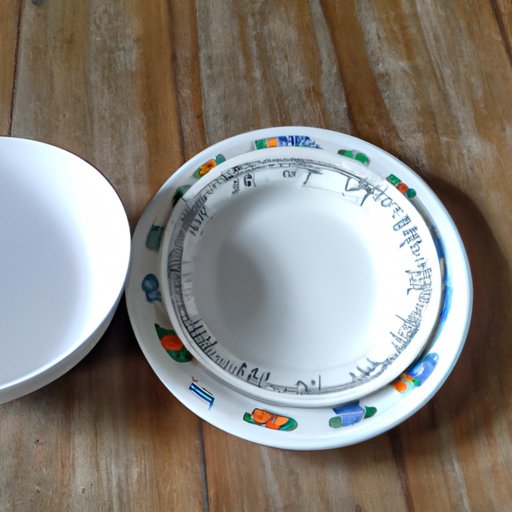Introduction
Eating smaller portions is an effective way to maintain a healthy weight and practice mindful eating habits. But what does it mean to eat smaller portions? In general, it means controlling the amount of food consumed during meals and snacks so that calories are balanced with activity levels.
The benefits of eating smaller portions are numerous. Not only can it reduce the risk of obesity and chronic health conditions such as heart disease, stroke, and diabetes, but it can also help with maintaining energy levels throughout the day and improving overall mood. Additionally, eating smaller portions can help you become more aware of your body’s hunger and fullness cues and make healthier choices when it comes to food.

Choose Smaller Plates and Bowls for Meals
Choosing smaller plates and bowls for meals is one of the easiest and most effective ways to control portion sizes. Research has shown that people tend to eat whatever is served on their plate, regardless of its size. So if you serve yourself a large portion of food on a big plate, you’re likely to eat it all without noticing how much you’re consuming.
When selecting plates and bowls for your meals, try to choose ones that are roughly 8-10 inches in diameter. This will help ensure that you’re not overserving yourself and can help you better assess the amount of food you should be eating per meal.

Eat Slowly and Savor Each Bite
Eating slowly and savoring each bite can help you better recognize your body’s natural hunger and fullness cues. It also helps you enjoy your food more and reduces the likelihood of overeating. To slow down when eating, try putting your fork or spoon down between bites, chewing each bite thoroughly, and focusing on the taste and texture of the food.
Research has found that when people eat slowly and mindfully, they tend to eat less overall. A study published in the Journal of the American Dietetic Association showed that when participants were asked to eat slowly and pay attention to their food, they ate about 10% fewer calories than those who didn’t focus on their meals.

Measure Out Servings of Food Before Eating
Measuring out servings of food before eating can be a helpful way to control portion sizes. This can be especially useful when cooking at home or when trying to avoid overeating certain foods, like desserts. When measuring out servings, use measuring cups and spoons to accurately gauge the correct amounts.
In addition to helping with portion control, measuring out food ahead of time can also save time and help with meal planning. By knowing exactly how much of each ingredient you need, you can plan ahead and have everything ready when it’s time to cook. Plus, it eliminates the guesswork of figuring out how much of each food to serve.
Avoid Eating Directly from the Package
Eating directly from the package can lead to overeating, since it’s difficult to tell how much food you’re actually consuming. Instead, try pre-portioning snacks and meals into individual servings before eating. This will help you stay mindful of your food intake and prevent you from overeating.
It’s also important to be aware of the serving sizes listed on food packages. For example, if a package of chips states that one serving size is 30 chips, be sure to measure out 30 chips before eating and not exceed that amount. This will help you keep track of how much you’re consuming and prevent you from overeating.
Eat Only When Feeling Hungry
Eating only when feeling hungry is another way to practice mindful eating and control portion sizes. Signs of true hunger include feeling weak or lightheaded, having a growling stomach, or experiencing low energy levels. If you’re not sure if you’re truly hungry, wait for a few minutes and see if the feeling passes.
Waiting until you’re genuinely hungry before eating can help you better recognize your body’s hunger and fullness signals. It also allows you to enjoy your food more and prevents you from overeating due to boredom or emotional eating.
Drink Water or Other Non-Caloric Beverages Before Meals
Drinking water or other non-caloric beverages before meals can help fill up your stomach and reduce the amount of food consumed. Studies have found that drinking water before meals can lead to reduced calorie intake and increased feelings of fullness. Additionally, drinking water has many other health benefits, such as helping to flush toxins from the body and improve digestion.
If you don’t like the taste of plain water, try adding slices of fruit or herbs for flavor. Other non-caloric beverage options include unsweetened tea, coffee, seltzer water, and low-sugar juices.
Conclusion
Eating smaller portions is an effective way to maintain a healthy weight and practice mindful eating habits. The best way to do this is to choose smaller plates and bowls for meals, eat slowly and savor each bite, measure out servings of food before eating, avoid eating directly from the package, eat only when feeling hungry, and drink water or other non-caloric beverages before meals. With a little bit of practice, you’ll be able to eat smaller portions and enjoy your food more.
(Note: Is this article not meeting your expectations? Do you have knowledge or insights to share? Unlock new opportunities and expand your reach by joining our authors team. Click Registration to join us and share your expertise with our readers.)
